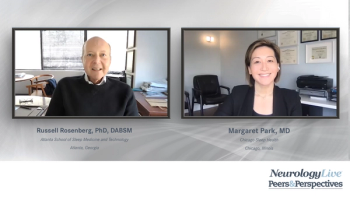
Drs Margaret Park and Russell Rosenberg illuminate challenges patients and providers face with narcolepsy medications, including potential substance abuse with scheduled substances.

Drs Margaret Park and Russell Rosenberg illuminate challenges patients and providers face with narcolepsy medications, including potential substance abuse with scheduled substances.

Russell Rosenberg, PhD, DABSM, and Margaret Park, MD, review the optimal treatment selection of pharmacologic options for the management of patients with narcolepsy.
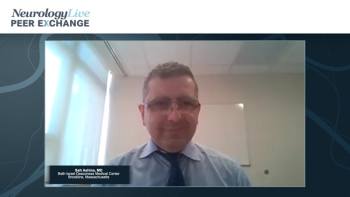
Andrew C. Charles, MD; Jessica Ailani, MD; and Sait Ashina, MD, discuss the impact of migraine on a patient’s quality of life and share strategies for reducing the clinical burden of disease.
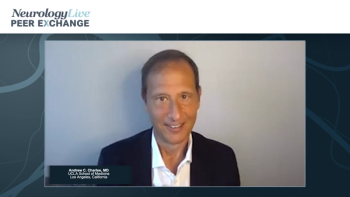
Andrew C. Charles, MD, and Sait Ashina, MD, provide an overview of the pathophysiology of migraine and discuss its 5 clinical phases.
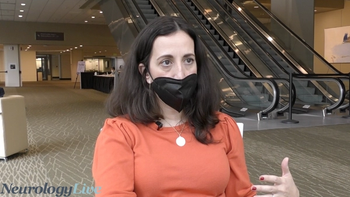
The professor of neurology at NYU Langone Grossman School of Medicine discussed what high-potential repurposed medications could be an option to treat symptoms of COVID-19 and the realistic possibility of clinical trials. [WATCH TIME: 4 minutes]
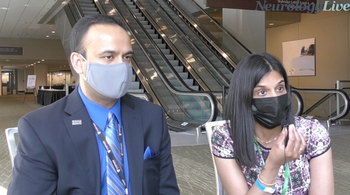
The chair and vice-chair of the Headache and Facial Pain Section of the American Academy of Neurology discussed some of the key research needs for migraine care going forward. [WATCH TIME: 3 minutes]
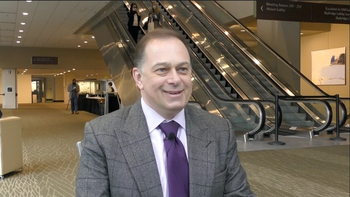
The clinical research director of the UCSF Multiple Sclerosis Center discussed the recently presented analysis on ublituximab’s effect on disability in relapsing MS and the critical need to focus on improving quality of life. [WATCH TIME: 4 minutes]
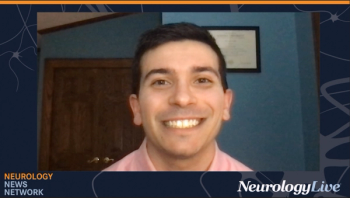
Neurology News Network for the week ending April 16, 2022 [WATCH TIME: 3 minutes]
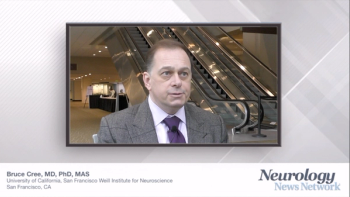
Bruce Cree, MD, PhD, MAS, FAAN, shared his thoughts on the data from the ULTIMATE I and II studies of ublituximab's effect on measures of MS disability, including EDSS and 9HPT scores.
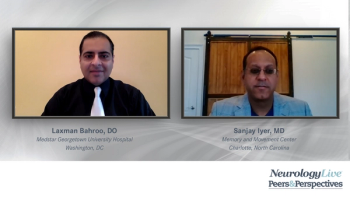
Key opinion leaders in movement disorders evaluate the potential benefits and effect of an apomorphine infusion currently in development for the management of OFF episodes in Parkinson disease.

Expert neurologists review the delivery systems of various on-demand therapy formulations and comment on their advantages and disadvantages.
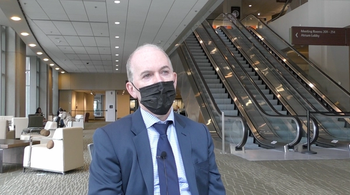
The medical director and chief medical officer of the New England Center for Neurology and Headache discussed notable data from the STEMTRA trial, and the progress made in the field of regenerative medicine. [WATCH TIME: 2 minutes]
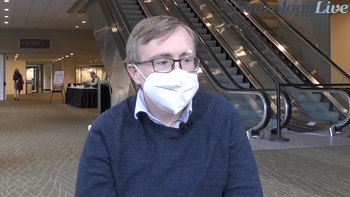
The assistant professor of neurology at the University of Pennsylvania discussed stroke risk among patients with COVID-19 and the need to seek neurological consultation. [WATCH TIME: 3 minutes]

Expert sleep specialists explore the use of nonpharmacologic treatment approaches for the management of narcolepsy.

Drs Margaret Park and Russell Rosenberg discuss challenges in the diagnosis of narcolepsy.

Key opinion leaders in sleep medicine discuss patient recognition of cataplexy symptoms in narcolepsy and their approach to narcolepsy diagnosis.

EEG Talk is a series dedicated to teaching electroencephalogram (EEG) reading skills in neurology in a way that is both digestible and fun. New episodes featuring special guests in the field are posted regularly on Mondays.
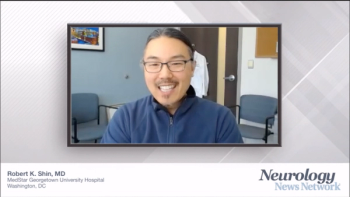
Robert K. Shin, MD, offered his perspective on the novel therapies being developed for multiple sclerosis, highlighting the potential of Bruton tyrosine kinase inhibitors for progressive disease.
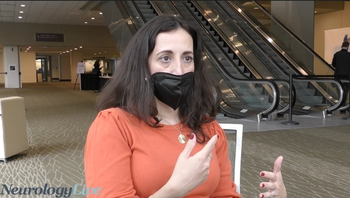
The professor of neurology at NYU Langone Grossman School of Medicine broke down the knowns and unknowns about long-term changes related to COVID-19, their legitimacy, and associations with neurodegenerative disorders. [WATCH TIME: 6 minutes]
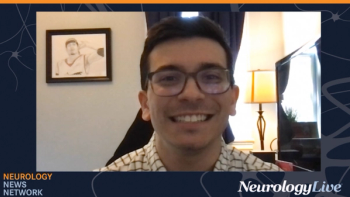
Neurology News Network for the week ending April 9, 2022. [WATCH TIME: 4 minutes]
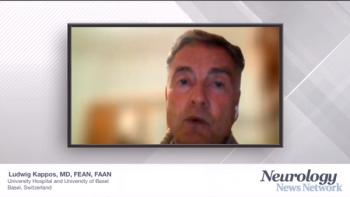
Ludwig Kappos, MD, FEAN, FAAN, provided insight on a new analysis that showed greater proportions of patients achieving no evidence of disease activity on ozanimod compared with interferon ß-1a.
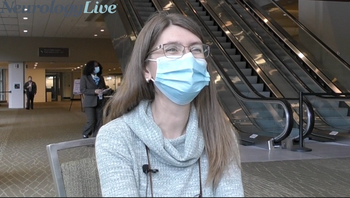
The pediatric neurologist and epilepsy specialist at Colorado Children’s Hospital discussed new data presented at AAN 2022 on the use of recently approved fenfluramine in patients with Lennox-Gastaut syndrome. [WATCH TIME: 3 minutes]

The clinical research director of the UCSF Multiple Sclerosis Center offer his perspective on the 3 available agents for the treatment of patients with neuromyelitis optica spectrum disorder. [WATCH TIME: 2 minutes]
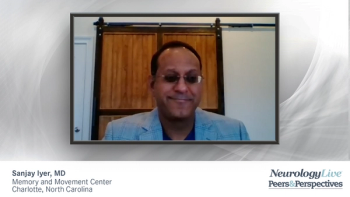
Laxman Bahroo, DO, and Sanjay Iyer, MD, share considerations regarding the optimization of treatment selection and the addition of on-demand therapies to manage OFF episodes in Parkinson disease.
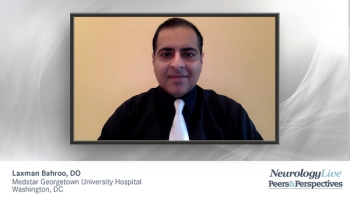
Drs Laxman Bahroo and Sanjay Iyer assess the potential variability in levodopa absorption in the gut and its impact on OFF episodes for patients with Parkinson disease.
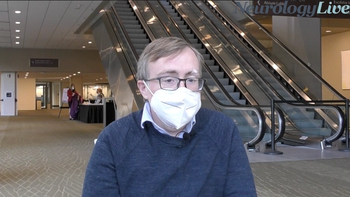
The assistant professor of neurology at the University of Pennsylvania discussed the similarities observed between the results of neurological exams in patients with COVID-19 vs other respiratory infections. [WATCH TIME: 3 minutes]
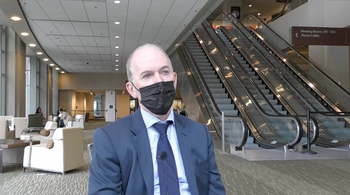
The medical director and chief medical officer of the New England Center for Neurology and Headache spoke to the phase 2 STEMTRA trial results of the stem cell treatment SB623. [WATCH TIME: 4 minutes]

The director of the Parkinson’s Disease and Movement Disorder Center at the University of South Florida detailed the data presented at AAN 2022 and IPX-203’s potential in Parkinson disease. [WATCH TIME: 3 minutes]
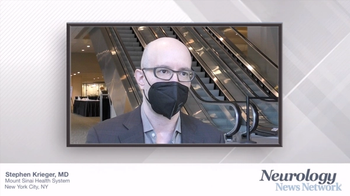
Stephen Krieger, MD, spoke about the latest safety data on ofatumumab (Kesimpta; Novartis) and the progress made in novel therapeutics for multiple sclerosis.

Russell Rosenberg, PhD, DABSM, and Margaret Park, MD, review the case of a 15-year-old girl who presents with excessive daytime sleepiness and share clinical impressions on diagnosis and treatment.